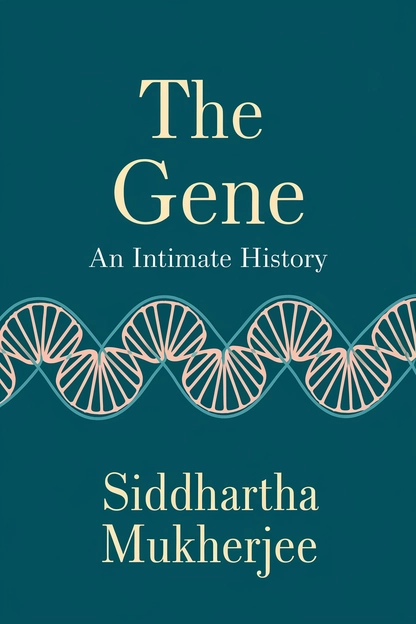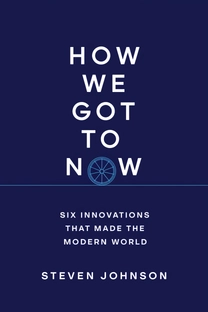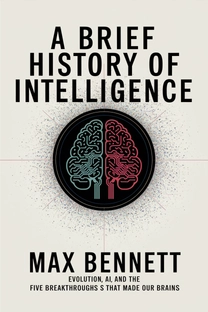
The Gene
An Intimate History
by Siddhartha Mukherjee
Brief overview
This book traces the journey of genetics from its earliest theories to the powerful techniques shaping modern biology. Expect to explore how single genes can define traits or cause disease, how environment interacts with DNA, and the ethical struggles that arise when we learn to alter our genetic destinies.
Introduction
Peering into the history of genetics is like gazing into a mirror that reflects both scientific discoveries and human stories. From anxious parents wondering about inherited traits to groundbreaking labs searching for the nature of our DNA, genes have captivated us for decades.
In these pages, you’ll see that genetics isn’t merely about peas or lab equipment—it’s bound to our personal identities, diseases, and family legacies. Questions about mental illness, personality, and even human destiny become wrapped up in the language of genes.
This introduction sets the stage: the quest to unravel heredity has been fueled by equal parts curiosity and deep-seated worry. Still, our growing power to decode—and perhaps rewrite—DNA remains both thrilling and unsettling.
As you move forward, keep in mind that while the science of genetics can be exact, its consequences are often surprisingly personal. Each discovery illuminates who we are, but also provokes new questions about our role in shaping who we might become.
Seeds of Discovery
Our adventure begins with a quiet monk in his garden. Gregor Mendel, tending peas in 19th-century Europe, devised experiments that hinted inheritance was anchored by discrete factors—later called genes. He learned certain traits didn’t just blend and vanish; they showed predictable patterns across generations.
Meanwhile, Charles Darwin wrestled with evolution: how new variations arose and survived seemed incompatible with the idea of traits smearing into a single average. Mendel’s peas, though mostly ignored then, resolved a core puzzle: traits could remain separable and resurface in later generations, preserving variation for natural selection.
Mendel published his findings in 1866, yet hardly anyone noticed. His data-centric approach was revolutionary, but it didn’t catch on until decades later. Only when Hugo de Vries, Carl Correns, and Erich von Tschermak rediscovered his work around 1900 did the science of genetics ignite with full force.
What is The Gene about?
“The Gene: An Intimate History” takes readers on a far-reaching journey through the evolution of genetics, linking historic experiments to the gene-based advances of today. Siddhartha Mukherjee shows how single genes can affect health and traits, and how a mix of environment and heritable factors shapes who we are. From Mendel’s peas to modern discussions on editing the human genome, the book highlights the power of DNA to define our lives—and the moral choices it raises.
Seamlessly weaving science with personal stories, Mukherjee reminds us why understanding genetics is vital. He covers the dark legacy of eugenics, the promise of epigenetics, and the modern debate on altering our genetic code. This balanced account underscores how knowing our genetic makeup can clarify health risks, drive medical innovation, and prompt reflection on that delicate line between discovery and responsibility.
Review of The Gene
This work stands out for its exploration of both the scientific milestones and cultural shifts that have shaped our understanding of inheritance. Mukherjee’s talent lies in blending dense scientific concepts with narratives that show why genes matter to everyone, not just researchers. Readers gain insights into breakthroughs like DNA’s double helix, but also into the ethical questions around manipulating that code.
The book’s wide-ranging approach makes it applicable for clinics, classrooms, or casual enthusiasts who want to see why genetics impacts modern health and medicine. Its language remains accessible, even when covering advanced topics such as gene editing or epigenetics, offering helpful context and real-world examples. Highly recommended for anyone curious about the roots of hereditary science, its real-life applications, and the responsibilities that come with such profound knowledge.
Who should read The Gene?
- Healthcare professionals seeking deeper context for genetic testing
- Science students curious about how genetics connects laboratory findings to human lives
- Historians or ethicists examining the influence of eugenics and modern genetic interventions
- Readers concerned about inherited illnesses and emerging gene therapies
About the author
Book summaries like The Gene
Why readers love Mindleap
10-Minute Book Insights
Get the core ideas from the world's best books in just 10 minutes of reading or listening.
Curated For You
Discover your next favorite book with personalized recommendations based on your interests.
AI Book ExpertNew
Chat with our AI to help find the best book for you and your goals.
Reviews of MindLeap
Love how I can get the key ideas from books in just 15 minutes! Perfect for my busy schedule and helps me decide which books to read in full.
Alex R.
The summaries are incredibly well-written and the audio feature is perfect for my commute. Such a time-saver!
Jessica M.
Great app for personal growth. The insights are clear and actionable, and I love how they capture the essence of each book.
Chris P.
The app is beautifully designed and the summaries are top-notch. Definitely worth every penny!
Sarah K.




